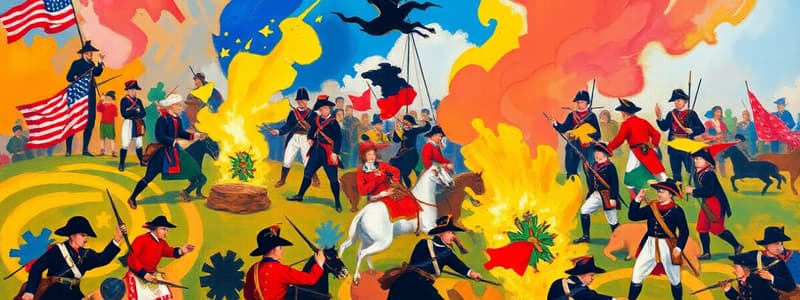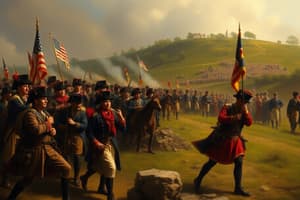Podcast
Questions and Answers
What event marked the beginning of armed conflict between colonists and British forces?
What event marked the beginning of armed conflict between colonists and British forces?
- Battle of Saratoga
- Battle of Bunker Hill
- Boston Tea Party
- Battle of Lexington and Concord (correct)
Which battle is considered the turning point of the American Revolution due to securing French support?
Which battle is considered the turning point of the American Revolution due to securing French support?
- Battle of Saratoga (correct)
- Battle of Lexington and Concord
- Battle of Yorktown
- Battle of Bunker Hill
Who was the principal author of the Declaration of Independence?
Who was the principal author of the Declaration of Independence?
- George Washington
- King George III
- Thomas Jefferson (correct)
- Benjamin Franklin
What series of measures were enacted in response to the Boston Tea Party and aimed to punish the colonists?
What series of measures were enacted in response to the Boston Tea Party and aimed to punish the colonists?
Which treaty formally ended the Revolutionary War and recognized American independence?
Which treaty formally ended the Revolutionary War and recognized American independence?
Who commanded the Continental Army during the American Revolution?
Who commanded the Continental Army during the American Revolution?
Which battle was fought in June 1775 and bolstered colonist morale despite their loss?
Which battle was fought in June 1775 and bolstered colonist morale despite their loss?
What was the first governing document of the United States that created a weak central government?
What was the first governing document of the United States that created a weak central government?
What led to the unified opposition of the colonies to British rule prior to the war?
What led to the unified opposition of the colonies to British rule prior to the war?
Which event involved colonists protesting against a tax by dumping tea into Boston Harbor?
Which event involved colonists protesting against a tax by dumping tea into Boston Harbor?
Flashcards are hidden until you start studying
Study Notes
Causes Of The War
- Taxation without Representation: Colonists opposed British taxes imposed without their consent (e.g., Stamp Act, Townshend Acts).
- Boston Tea Party (1773): Protest against the Tea Act where colonists dumped tea into Boston Harbor, escalating tensions.
- Intolerable Acts (1774): Series of punitive measures in response to the Boston Tea Party that united colonies against Britain.
- Desire for Independence: Enlightenment ideas inspired colonists to seek self-governance and individual rights.
Key Battles
- Battle of Lexington and Concord (April 1775): First battles of the war, signaling the start of armed conflict.
- Battle of Bunker Hill (June 1775): Early, costly battle for British; boosted colonist morale despite the loss.
- Battle of Saratoga (September-October 1777): Turning point; American victory that secured French support for the revolution.
- Battle of Yorktown (September-October 1781): Last major battle; British General Cornwallis’ surrender effectively ended the war.
Major Figures
- George Washington: Commander of the Continental Army; led American forces to victory and became the first President.
- Thomas Jefferson: Principal author of the Declaration of Independence; advocate for individual rights and liberty.
- Benjamin Franklin: Diplomat who secured French support; key figure in colonial unity.
- King George III: British monarch; represented the imperial authority the colonists rebelled against.
Treaties And Agreements
- Treaty of Paris (1783): Ended the Revolutionary War; recognized American independence and established borders.
- Articles of Confederation (1777): First governing document of the United States; established a weak central government.
- French Alliance (1778): Formal agreement with France; provided military support to the American cause against Britain.
Causes of the American Revolutionary War
- Colonists opposed British taxes imposed without their consent, such as the Stamp Act and Townshend Acts.
- The Boston Tea Party in 1773 saw colonists dumping tea into Boston Harbor, escalating tensions with Britain.
- The Intolerable Acts, a series of punitive measures against the colonies in response to the Boston Tea Party, further united colonists against Britain.
- Enlightenment ideas inspired colonists to seek self-governance and individual rights, fueling their desire for independence.
Key Battles of the American Revolution
- The Battle of Lexington and Concord in April 1775 marked the beginning of armed conflict between colonists and British forces.
- The Battle of Bunker Hill in June 1775 was costly for the British despite a victory, showcasing the fighting spirit of the colonists.
- The Battle of Saratoga, a decisive American victory in September-October 1777, secured French support for the revolution.
- The Battle of Yorktown in September-October 1781 concluded the war with the surrender of British General Cornwallis.
Major Figures in the American Revolution
- George Washington, Commander of the Continental Army, led the American forces to victory and later became the first President of the United States.
- Thomas Jefferson was the principal author of the Declaration of Independence and a strong advocate for individual rights and liberty.
- Benjamin Franklin, a skilled diplomat, secured French support for the revolution and played a key role in unifying the colonies.
- King George III, the British monarch, represented the imperial authority against which the colonists rebelled.
Treaties and Agreements
- The Treaty of Paris in 1783 officially ended the Revolutionary War, recognizing American independence and establishing the nation's borders.
- The Articles of Confederation, adopted in 1777, served as the first governing document of the United States, though it established a weak central government.
- The French Alliance of 1778, a formal agreement with France, provided crucial military support to the American cause during the war.
Studying That Suits You
Use AI to generate personalized quizzes and flashcards to suit your learning preferences.




